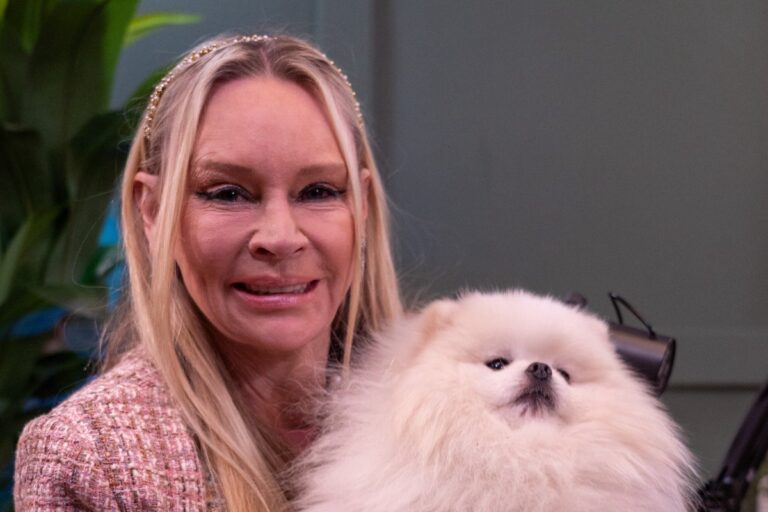The text came through on a Tuesday afternoon. “This is the Queen of Versailles. I can’t wait to meet u.” Jackie Siegel — the socialite-turned-reality star whose life of unapologetic excess first transfixed audiences in the 2012 documentary The Queen of Versailles — has spent more than two decades building a 90,000-square-foot palace in Florida and an equally baroque public persona to match. Now, her story has been reimagined as a Broadway musical, with Kristin Chenoweth donning the tiara. The production promises to explore Jackie’s improbable climb from small-town obscurity to multimillionaire notoriety, and the series of tragedies that have reshaped her life. But whether it’s a glittery celebration, a cautionary tale, or simply a chaotic swirl of both is harder to pin down.
I join Jackie for a preview performance of the show ahead of our sit-down interview, hoping to understand why her story still commands an audience — and why she believes this musical, of all forms, is the way to tell it. She arrives in the mezzanine at 7:32 p.m. for a 7:30 p.m. curtain (of course, the theater knows better than to start the show before the queen is seated), clad in a pale pink sweater dress, fur scarf, knee-high boots, black bow sash at her waist and a glittering tiara. Once she and her crowned entourage of eight friends settle into their seats, she quietly slips me a matching sparkly headpiece.
The show itself is a spectacle with shimmering costumes and a Versailles set reveal so elaborate that the audience gasps. Chenoweth plays Jackie with cartoonish buoyancy, but the musical can’t quite decide what tone it wants to strike. One moment it winks at the absurdity of striving to build America’s biggest house; the next, it drops into a sombre retelling of the Siegels’ family tragedies — particularly the death of her 18-year-old daughter, Victoria, from a drug overdose. The tonal whiplash is real: glitter, grief, punchlines, ballads. It’s earnest and gaudy and oddly moving in parts, and at other times so disjointed you can feel the audience recalibrating.
Sitting beside Jackie, the emotional pivots land differently. She leans in frequently — “that’s a true story,” “I love how they change the sets” — but falls silent and fidgets when Victoria’s heartwrenching Act II solo begins or when her late husband David (played by F. Murray Abraham), who died in April, appears onstage. When the curtain falls, she fixes me with wide eyes. “What did you think?” The eagerness is almost childlike.
Two weeks later, we meet again — this time in a recording studio, with her Pomeranian Mochi in her lap and two assistants within arm’s reach. She’s wearing a pink top and cream pants, paired with over-the-knee tan suede boots and a pink tweed blazer. It’s giving Equestrian Barbie. Without the distraction of a musical in motion, Jackie feels more controlled but no less theatrical. She cycles between upbeat chatter, earnest reflection, and surprising candor about the grief that has shaped her life over the past decade: Victoria’s 2015 death; the loss of her stepson Steven last year; and, on the very same day David died, the sudden death of her only sister, Jessica Mallery, from cocaine laced with fentanyl.
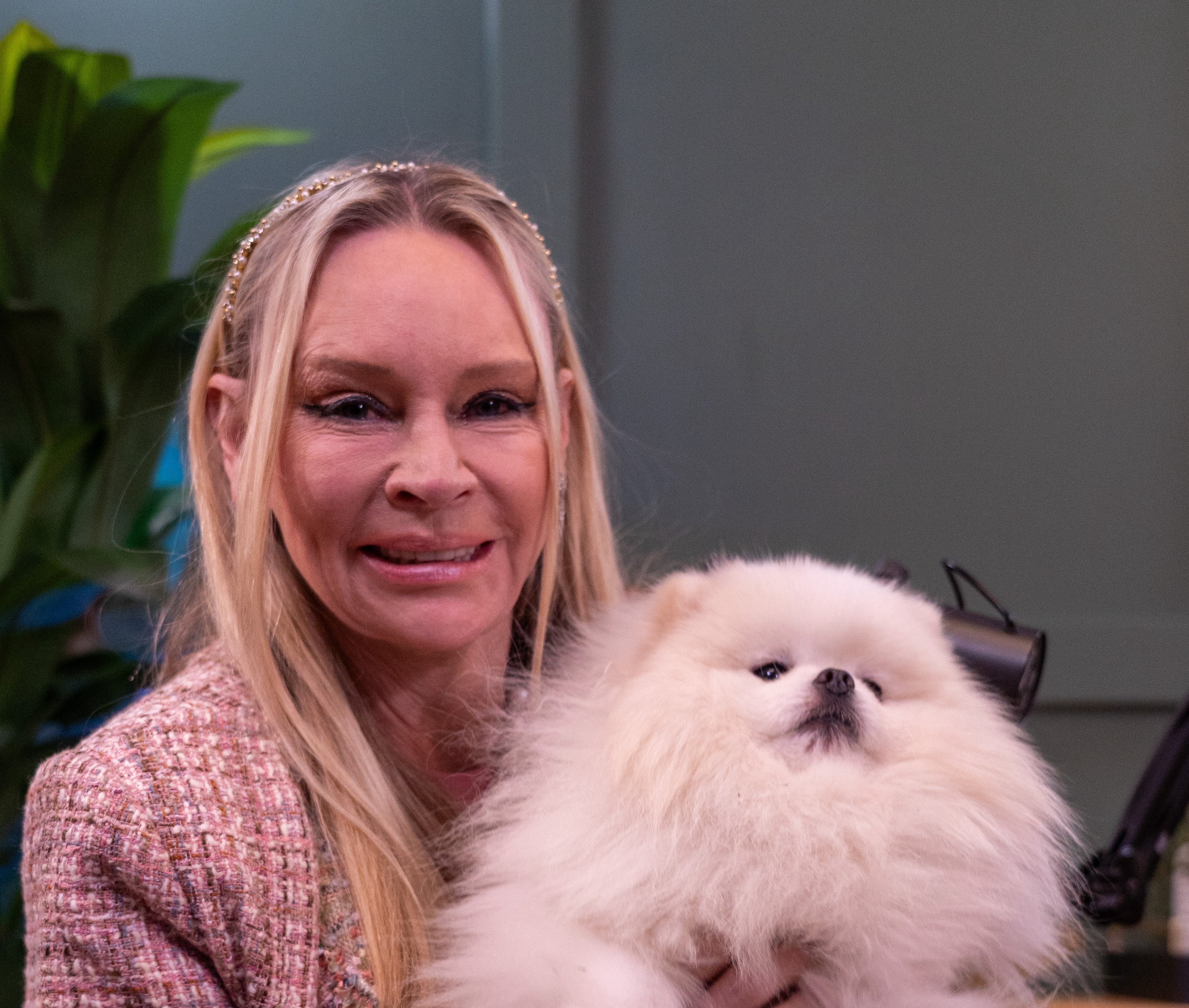
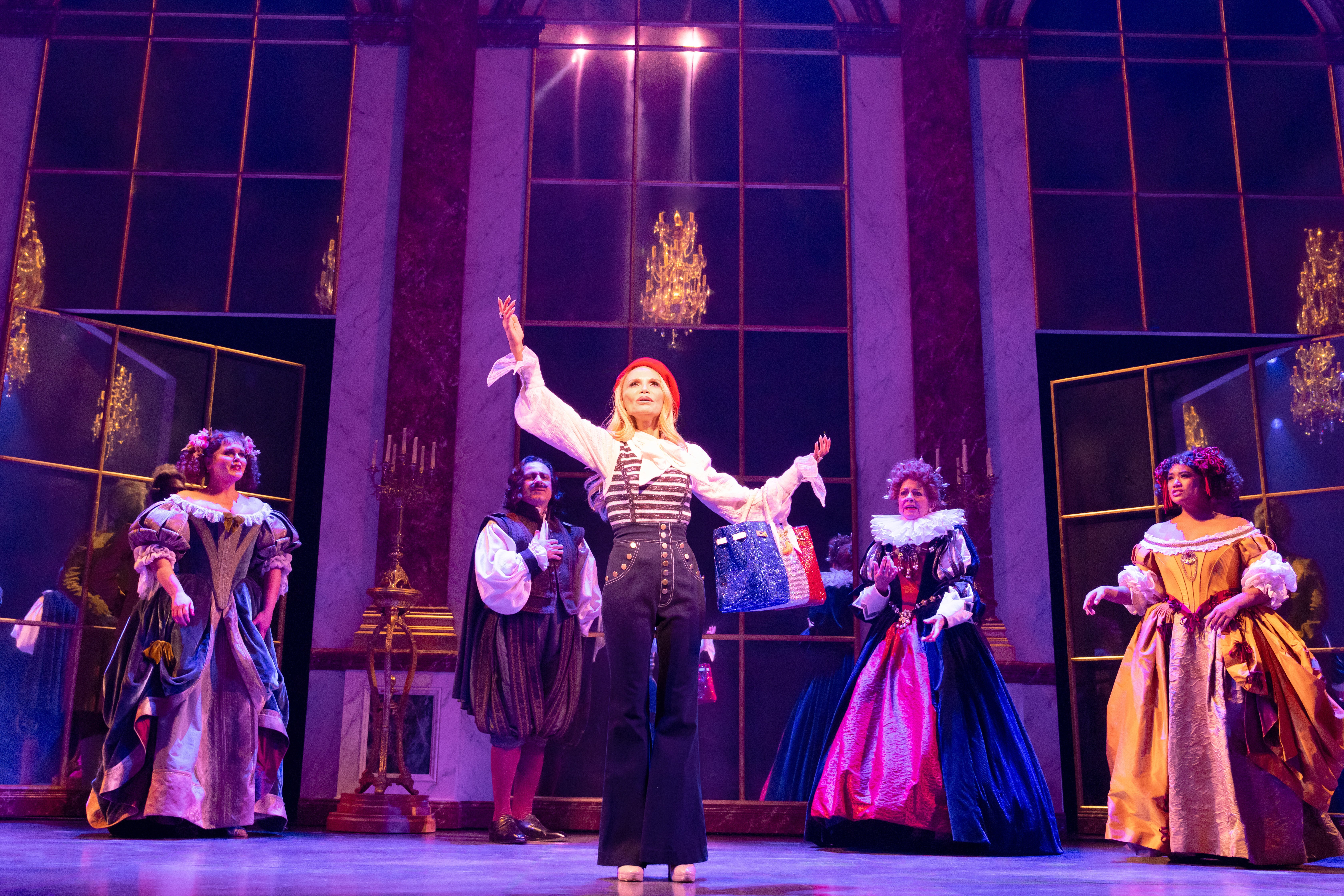
“We’re living in a very tough world,” she tells me. “This show was just so emotional for me because a lot of the people in it are no longer alive, and I felt like they brought them back to life. I have some of the most amazing things happening in my life, like with the Broadway show and the most wonderful people. But it’s so weird because I’ve got the worst happening in my life as well.”
Jackie claims that the billionaire husband, the mansion, the reality show and now the play were never part of any grand design. “I wasn’t out to seek any of this stuff. I wasn’t out to build the largest home in America,” she says. “I mean, it was just all thrown on my plate.” Her life remains dominated by Versailles. Construction is — theoretically — nearing completion after more than 20 years. She’s been toying with the idea of merging her 60th birthday with Versailles’ long-awaited debut early next year. “I wanna do a big opening party,” she says excitedly.
She is now the sole parent of eight adult children (the six she shared with David, plus two nieces whose mothers died of overdoses) while juggling brand ventures like Queen of Versailles Coffee and continuing her activism against the opioid epidemic. “This drug epidemic is just so horrible,” she says. “When I went through the loss of — especially my daughter — me and my husband, we donated the rest of our lives to spare other families and educate them about the drug epidemic.”
The couple launched the Victoria’s Voice Foundation shortly after their daughter’s death, with the goal of helping to prevent future drug overdose deaths. She is proud of the work she and David did leading up to the passing of the Comprehensive Addiction and Recovery Act in 2016. She speaks with equal enthusiasm about hosting charity galas at Versailles and about her recent White House appearance for the signing of the Half Fentanyl Act (she has known President Donald Trump since her days on the beauty pageant circuit).
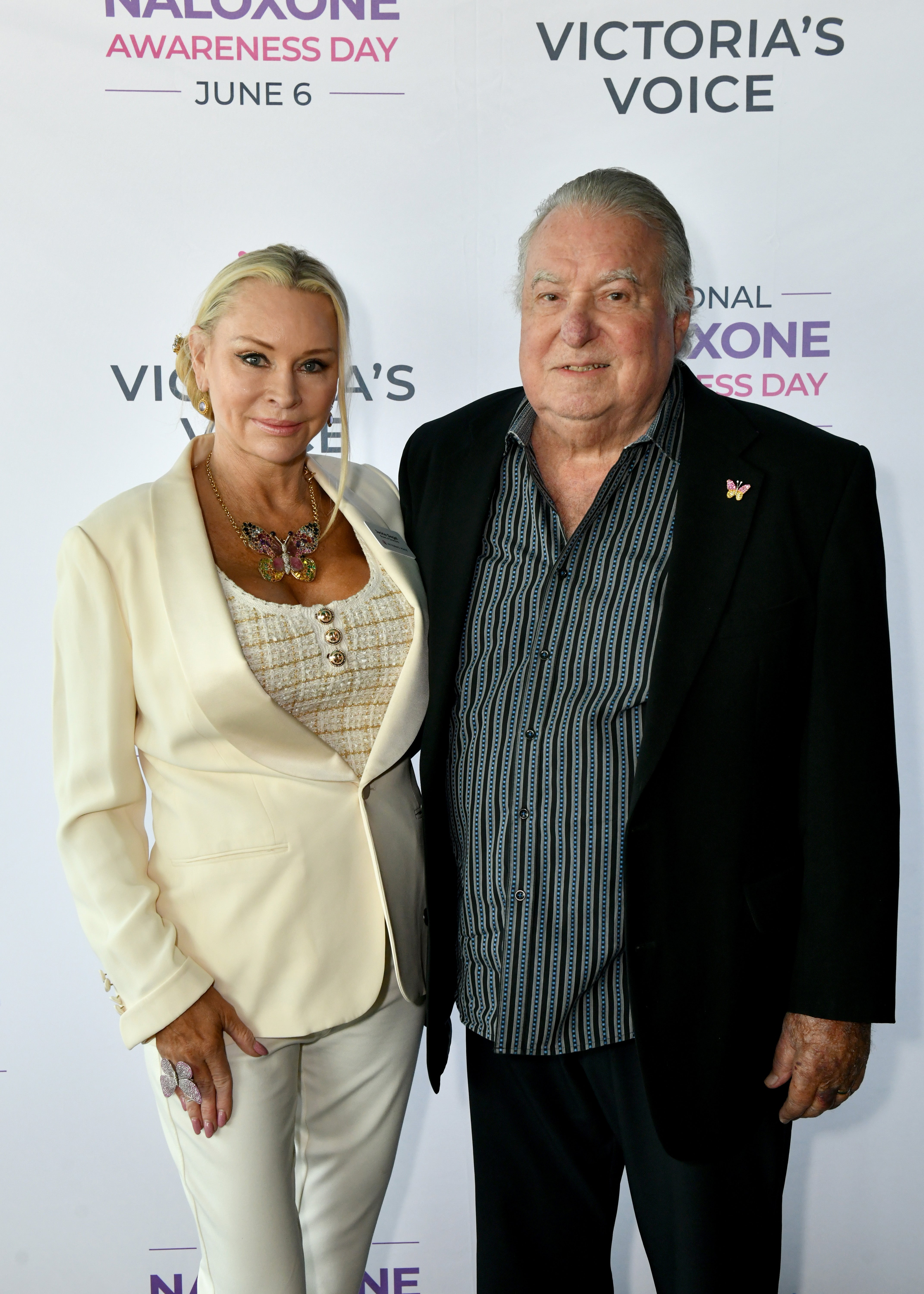
There is a genuine purpose behind her work, but it sits atop the same mountain of spectacle as everything else in her life. “I wanna throw events at our house and bring people together,” she tells me, eagerly. “I mean, God put me in a position. This really isn’t for me. Why, in this moment in time, coming from a small town, when this is beyond all of my dreams — why is this all happening?” Her activism, then, is not a departure from Versailles but an extension of it — another part of the sprawling empire she and David built together.
Jackie often speaks as if her tragedies form part of a moral design. She says, “It’s about spreading love. That’s really, really what I want to do because I have so much darkness in my life and I found a way to turn it into light. Because if I didn’t have the tragedies that I had, maybe with the Versailles house that my husband put in my path, we could have gone into a life of gluttony and that’s not what God would’ve wanted.” It’s as if she’s suggesting that immense loss was a corrective — even a divine one.
Her belief in fate surfaced most poignantly after Victoria’s death. In 2019, to coincide with the launch of their foundation, Jackie and David published Victoria’s journal, which chronicled her struggle with drug abuse. While it might seem like an unusual choice, it was actually Victoria’s dying wish that the journal be published to help others — a wish she had shared in a letter to her parents. In another message, she seemingly foresaw her mother’s future Broadway success.
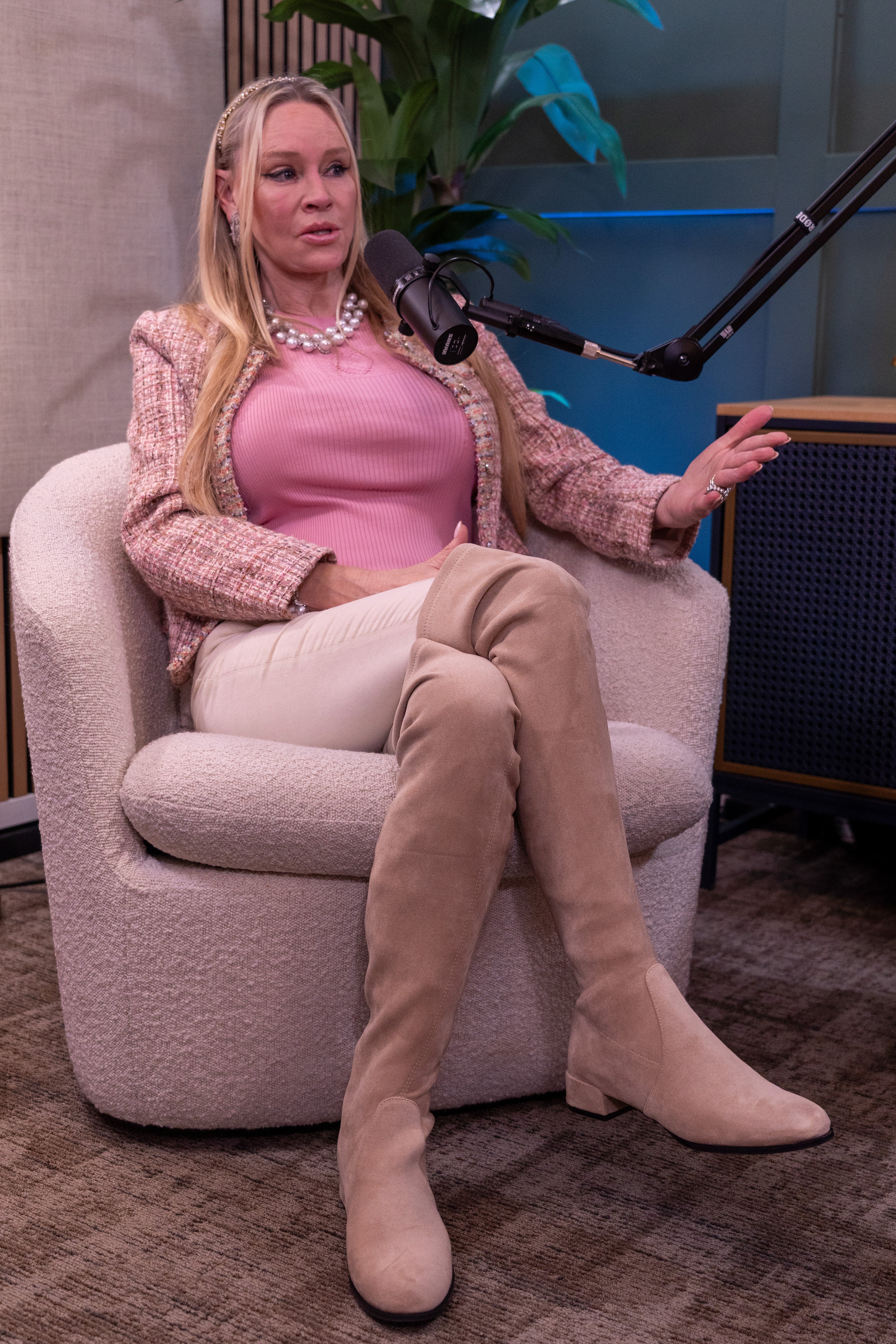
“My daughter took a bunch of pills before she passed away — the first time that she thought she overdosed. And she left a text —- [she] sent it to a friend, [saying] that if she didn’t wake up the next morning to send it to me,” Jackie tells me. “She said that she saw me getting a Grammy on a stage and I would be getting the award and I’ll feel her peaceful presence as an angel because she’ll be there by my side. And what I realize now, because I’m not a singer so there’s no Grammy, but I think it could be a Tony.”
Jackie speaks often in sweeping declarations about fate, faith, and the “greater mission” behind her wealth; in the next breath, she’ll pivot to the logistics of turning leftover gemstones into souvenirs for visitors at Versailles. At times, she seems acutely aware of her own spectacle; at others, she appears to fully inhabit it.
What’s most striking is how neatly she folds her trauma into that spectacle, as if loss and luxury are chapters of the same story. Her belief that tragedy steered her away from “gluttony” offers a glimpse into how she’s made sense of the unfathomable while continuing to build the life she’s known. It’s the same tension that the musical tries, and often fails, to balance: the dizzying glamor and the devastating cost.
Here is a woman who has suffered deeply yet insists on living loudly. What becomes clear, in the end, is that the Queen of Versailles isn’t a persona she adopts — it’s the only way she knows to survive.


